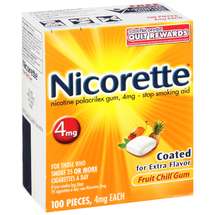Thank You for Chewing our Gum!
It’s well known that all big tobacco players are researching non-tobacco nicotine delivery systems.
Gum and patch manufacturers, with their 12-week dependency regime products will soon have to compete with similar products that provide “the spike” vs. theirs, which simply frustrate the nicotine addict by under-delivering low, steady levels of nicotine.
Website Tobaccofreekids.org, most likely an anti tobacco, pro-pharma site, reads like a Fox News Cigarette Fanboy’s dream. Loads of official cig/dip company visuals, tar and nic content info, and the latest articles from around the world. It can also be unintentionally hilarious.
One example, a critique of “Camel No.9” describes the marketing campaign, implying that it evokes “Chanel No. 5” and stilettos, and thus attracts female minors who read Vogue and Marie Claire. Dude? Where’s my demographic? Whatever happened to Pokemon?
The one ‘bright’ spot for TFK.org is encouragement of the use of the gums and patches with their “30-80% success rates over placebos.”
It‘s often said, “Quitting smoking is so easy, I’ve done it six times!”. I didn’t check to see if TFK reviewed the flavors (now with Whitening!), but I did consider signing up for the Nicorette Driver’s Seat Sweepstakes on the gum‘s site.
I hope after 12 weeks, users will want to/be able to quit Nicorette as well! The gum is now being marketed as a lifestyle choice, and not an OTC drug. What’s next, Nicotine-Free Nicorette for those who want to look like they’re struggling with nicotine addiction?
Dr. Brad Rodu, who is Professor of Medicine with an endowed chair in Tobacco Harm Reduction Research at the University of Louisville, Kentucky (big sign on his office door, I suppose. He gets tobacco funding), in a presentation moderated by KPMG in South Africa in May of 2006, sited a 7% success rate with these products in that country from the use of pharmaceuticals to quit smoking. In other words, more than 9 out of 10 cigarette smokers failed to stop smoking with Big Pharma products. Can you say ‘failure’?
Nicotine addicts are the issue here. They may want or need to get off the cigarettes now, and should have all avenues open to them. Snus is here today, and other nicotine products will most likely appear from the tobacco companies that are tobacco-free, and, hopefully, more effective in stopping or reducing smoking. Sites like TFK must choose to give those products airtime or expose a lack of credibility.
Today, at Walmart, I can watch a Nicorette ad on the video monitor as I shop, buy a pack of Nicotette gum, enter a Nicorette Sweepstakes, and stick with a product designed to work poorly. Or I can just walk by those tins of snus in the tobacco aisle without any available information about its benefits for smokers wanting to quit. Not allowed to mention it.
Just a note about “TFK.org:“Your name is a misnomer. Your issue no. 1 is preventing kids’ access to tobacco products. That’s about responsible and informed caregivers, and much better enforcement at the retail level. The site, given its name, is surprisingly not about that.
It’s about evil tobacco companies, ‘resources for quitting,’ and is really not about kids at all. Since it is already illegal for minors to buy or use tobacco products, TFK really wouldn’t have much to talk about if they stuck to the ‘save the kids’ theme, anyway.
And finally, some comic relief: $300 laser treatments to help one quit smoking because none of the gums or patches worked!
Sincerely,
ANDREW ROMEO
Live from New York on SnusCENTRAL.org
About author
You might also like
Mike Bloomberg Tries to Look Busy with Coke
Mike Bloomberg Looks Busy: Now with the Soft Drinks Welcome once again to liberal hold-fast New York City, where you cannot smoke in the park, Central or otherwise (Coming Soon
Philip Morris, Swedish Snus, and the Parliament brand in Russia
Parliament has been a popular cigarette in Russia since the late 1990s. Unlike in the US, it is super-premium, priced above Marlboro alongside brands like Davidoff and Sobranie. In 1998,
THE ROAD TO HELL IS PAVED WITH GOOD INTENTIONS – A Look Inside Taboca AS
Rumors, articles and independently confirmed facts underline the reality that Taboca AS, based in Oslo, Norway, and with production in Sweden on Gotland, has gone through a management overhaul. I





